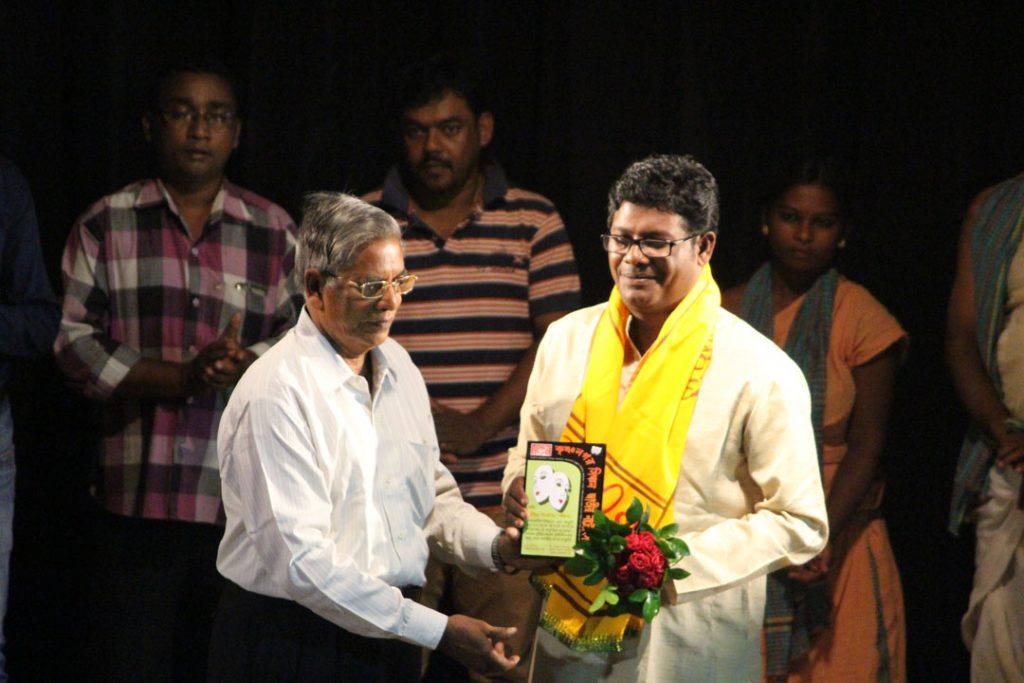Hirakud Dam, the first major multipurpose river valley project in post-independent India, was constructed to control flooding in the Mahanadi delta and help irrigation and power generation. Though the project illuminated lakhs of homes and irrigated over 2 lakh hectares of farm land, the pain of thousands of families of over 350 revenue villages that went under water is barely remembered by the administration or the beneficiaries.
But the members of Mirror Theatre, a troupe of Belpahar, a small town of Jharsuguda district near the Chhattisgarh border, have been highlighting the plight of the displaced for the last nine years.
“We are making some noise through our Sambalpuri language play Lal Paen (The Red Water) expecting that it would create some ripples in the administration,” said Subash Chandra Pradhan, the writer, director of the play and the founder of the troupe.
Interestingly, all the actors of this play belonged to the displaced families.
The troupe, a full-time theatre research and promotion organisation established in 1993, has so far staged more than 130 shows of the play across the country including the four metro cities, Delhi, Mumbai, Chennai and Kolkata.
In the last 25 years, the troupe members have staged nearly 1,000 shows of 25 plays and 400 shows of 10 children’s plays and participated in 74 theatre festivals across the country. They aim to transform Mirror Theatre into a model institution and bring socio-cultural change in the region. The aim is to set up a platform that can offer opportunities for artistic collaboration, research and creative expression, said Subash.
Speaking about Lal Paen, the 46-year-old theatre director said he was curious when he heard an old lady of Sambalpur saying that the Hirakud water was red. She was in fact referring to the people’s battle for survival after they were asked to vacate their village during the construction of the dam, said Subash. Before conceptualising the play, he met a few distressed families to understand their pain. Not even 10 per cent of the total displaced population has been rehabilitated or compensated, Subash said. Even this 10 per cent is still struggling to get basic amenities and has limited livelihood options, he added. That is how he got the idea for the play.
Lal Paen was the lone entry from Odisha in the Eighth Theatre Olympics, a prestigious national event organised by the National School of Drama, in 2018.
Subash continued: “Every play aims to entertain the viewers, but we try to give a strong message to society through our plays. Use of local dialect, Sambalpuri folk music and dance is the hallmark of all our plays. Most of our plays are in Sambalpuri language. We do it to establish a connect with the viewers as our target audience is the locals, particularly the poor.”
At a time when many theatre activists complain about shortage of funding, Subash takes pride in offering a comfortable life to his troupe members.
It is not at all difficult to lead a comfortable life by doing theatre, he asserted.
Subash has received much appreciation for his acting and directorial activities and worked with many eminent directors like Subodh Patnaik of Natya Chetana, Dhira Mallick of Satabdira Kalakar and Manoj Patnaik of Manana. He has also visited and performed in European countries like France, Belgium, Luxembourg, the Netherlands and Denmark in 2007. He was a participant in the World Congress of Drama in Norway and Kaustenen Folk Music Festival in Finland in 2001.
Subhash loves to put across his message to the audience at minimal cost.
“While many troupes consider an auditorium as a basic necessity, we perform even on a verandah or terrace to reach our audience,” he said.
For a 20-year-old youth who dreamt of bringing change in society, it was not easy to build up a theatre troupe. Belpahar is an industrial belt and finding actors was tough. This forced Subash and his associates to form a drama club in a private school with the support of some corporate houses. Gradually, these school students became ambassadors of theatre, said Subhash.
After working relentlessly for the last 25 years, Subash and his team members have managed to get an acre of land and aim to set up a 500-seat auditorium in Belpahar to offer a comfortable viewing experience to the audience. At present, the nearest auditorium is in Rourkela, about 150 km from Belpahar, he said.
While speaking about Subash’s dedication and commitment to theatre, well known theatre director Abhinna Routray said the plays of Mirror Theatre always speak about the issues of the soil.
“I won’t go into Subash’s presentation style, I am impressed by the ideologies that his plays present. I went to the silver jubilee celebration of Mirror Theatre last year and was surprised that the troupe had already staged more than a hundred shows for Lal Paen which is great. I am greatly impressed by the effort he has put in to create an environment for theatre’s growth in the region. He has the ability to strike a chord with his viewers,” said Abhinna.
“I heard about Subash’s perseverance and sincerity and this is one reason I invited him to come down to Bhubaneswar to present his play Lal Paen in my drama festival without having seen a single show. He is among the rare theatre workers who believe in hard work and devote their time entirely to theatre,” said eminent actor director and ex-president of Odisha Natya Sangh Manoj Patnaik. “You need to become a good human being first to be a good artiste and Subash is one such.”
BIJAY MANDAL, OP
